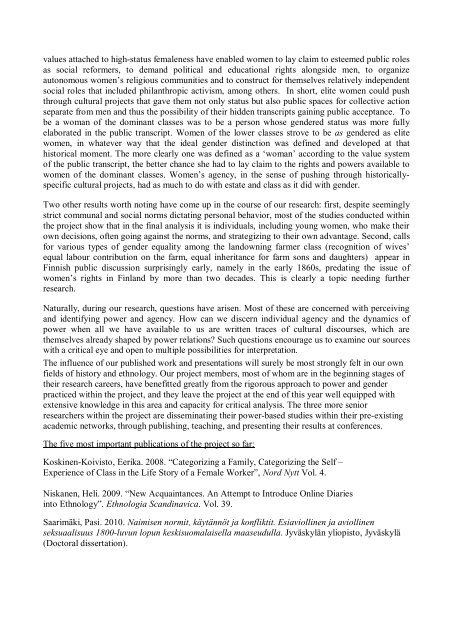Suomen Akatemia VALTA-OHJELMAN HANKKEIDEN TULOKSET
Suomen Akatemia VALTA-OHJELMAN HANKKEIDEN TULOKSET
Suomen Akatemia VALTA-OHJELMAN HANKKEIDEN TULOKSET
You also want an ePaper? Increase the reach of your titles
YUMPU automatically turns print PDFs into web optimized ePapers that Google loves.
values attached to high-status femaleness have enabled women to lay claim to esteemed public roles<br />
as social reformers, to demand political and educational rights alongside men, to organize<br />
autonomous women’s religious communities and to construct for themselves relatively independent<br />
social roles that included philanthropic activism, among others. In short, elite women could push<br />
through cultural projects that gave them not only status but also public spaces for collective action<br />
separate from men and thus the possibility of their hidden transcripts gaining public acceptance. To<br />
be a woman of the dominant classes was to be a person whose gendered status was more fully<br />
elaborated in the public transcript. Women of the lower classes strove to be as gendered as elite<br />
women, in whatever way that the ideal gender distinction was defined and developed at that<br />
historical moment. The more clearly one was defined as a ‘woman’ according to the value system<br />
of the public transcript, the better chance she had to lay claim to the rights and powers available to<br />
women of the dominant classes. Women’s agency, in the sense of pushing through historicallyspecific<br />
cultural projects, had as much to do with estate and class as it did with gender.<br />
Two other results worth noting have come up in the course of our research: first, despite seemingly<br />
strict communal and social norms dictating personal behavior, most of the studies conducted within<br />
the project show that in the final analysis it is individuals, including young women, who make their<br />
own decisions, often going against the norms, and strategizing to their own advantage. Second, calls<br />
for various types of gender equality among the landowning farmer class (recognition of wives’<br />
equal labour contribution on the farm, equal inheritance for farm sons and daughters) appear in<br />
Finnish public discussion surprisingly early, namely in the early 1860s, predating the issue of<br />
women’s rights in Finland by more than two decades. This is clearly a topic needing further<br />
research.<br />
Naturally, during our research, questions have arisen. Most of these are concerned with perceiving<br />
and identifying power and agency. How can we discern individual agency and the dynamics of<br />
power when all we have available to us are written traces of cultural discourses, which are<br />
themselves already shaped by power relations? Such questions encourage us to examine our sources<br />
with a critical eye and open to multiple possibilities for interpretation.<br />
The influence of our published work and presentations will surely be most strongly felt in our own<br />
fields of history and ethnology. Our project members, most of whom are in the beginning stages of<br />
their research careers, have benefitted greatly from the rigorous approach to power and gender<br />
practiced within the project, and they leave the project at the end of this year well equipped with<br />
extensive knowledge in this area and capacity for critical analysis. The three more senior<br />
researchers within the project are disseminating their power-based studies within their pre-existing<br />
academic networks, through publishing, teaching, and presenting their results at conferences.<br />
The five most important publications of the project so far:<br />
Koskinen-Koivisto, Eerika. 2008. “Categorizing a Family, Categorizing the Self –<br />
Experience of Class in the Life Story of a Female Worker”, Nord Nytt Vol. 4.<br />
Niskanen, Heli. 2009. “New Acquaintances. An Attempt to Introduce Online Diaries<br />
into Ethnology”. Ethnologia Scandinavica. Vol. 39.<br />
Saarimäki, Pasi. 2010. Naimisen normit, käytännöt ja konfliktit. Esiaviollinen ja aviollinen<br />
seksuaalisuus 1800-luvun lopun keskisuomalaisella maaseudulla. Jyväskylän yliopisto, Jyväskylä<br />
(Doctoral dissertation).


